The Poetic Edda: A Study Guide
The Speech of the Masked One
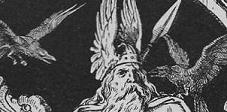
[PREVIOUS][MAIN][NEXT]
[HOME]
|
Codex Regius
MS No. 2365 4to [R] |
Arnamagnæan Codex
AM 748 I 4to [A] |
1954
Guðni Jónsson,
Normalized Text: |
|
3. Heill skaltu, Agnar,
alls þik heilan biðr veratyr vera; eins drykkjar þú skalt aldrigi betri gjöld geta. |
3. Hæill skaltu,
Agnar, alls þik heilan biðr væra týr vera; eins drykkjar þú skalt aldrigi betri giællð geta. |
3. Heill skaltu, Agnar,
alls þik heilan biðr Veratýr vera; eins drykkjar þú skalt aldrigi betri gjöld geta. |
English Translations
in Icelandic Poetry
“The Song of Grimnir”
The Yale Magazine, Vol. 16
“The Song of Grimner”
That to thy bounty will succeed;
Safe shalt thou reign from ev'ry foe, ---
Smooth shall thy tide of fortune flow.
More rich reward thou never couldst receive
E'en hadst thou filled the horn with dew from heaven.
in Edda Sæmundar Hinns Frôða
“The Lay of Grimnir”
in Corpus Poeticum Boreale
“The Sayings of the Hooded One”
as blessed as the god of men
bids thee to be.
For one draught
thou never shalt
get better recompense.
(Here Woden breaks forth in song).
in Edda Saemundar
“The Sayings of Grimnir”
in The Poetic Edda
“Grimnismol: The Ballad of Grimnir”
shall call a blessing upon thee :
for one such draught thou shalt never more
so fair a guerdon win.
By the voice of Veratyr;
For a single drink shalt thou never receive
A greater gift as reward.
in The Poetic Edda
“The Lay of Grimnir”
in The Elder Edda
“The Lay of Grimnir”
3. All hail to thee, for happiness is given thee, Agnar, by Othin.
Better guerdon shalt never get for one beaker of beer.
Bids you a grateful greeting:
For one drink your reward shall be
Greater than any man got.
in Poems of the Elder Edda
“The Lay of Grimnir”
in The Poetic Edda
“Grimnir’s Sayings”
3. You’ll live happy Agnar; Odin, lord of
men,
will grant you all good fortune.
You won't again for just one drink
receive so great a reward.
3. Blessed shall you be Agnar,
Since Odin bids you be blest;
For one drink you shall never get
A better reward.
in The Poetic Edda, Vol. III
“The Lay of Grimnir”
2011 Andy Orchard
The Elder Edda: A Book of Viking Lore
'The Lay of Grimnir"
3. You shall be fortunate, Agnar,
for to fortune he invites you,
the God that Governs Men.
For one drink
you will never
get richer reward.
3. ‘You
shall have luck, Agnar,
since luck has been hidden
for you by the Man-god of men: [Odin]
for a single sip you shall never
receive a better reward.
The Poetic Edda
"The Words of Odin in Disguise"
The Poetic Edda
"Grimnir's Sayings"
Hail, Agnar,
it's the chief of the gods
who's wishing you well!
You will never be repaid
so well for one drink,
no matter how long you live,
has seen to it, blessed by the godhead
of men. You'll never be better rewarded
than this, for giving someone a single sip.
Carolyne Larrington, “Vafþrúðnismál and Grímnismál: Cosmic History, Cosmic Geography” in The Poetic Edda; Essays on Old Norse Mythology, 2002.
“Unlike most Eddic mythological poems (Rigthula is the only other real exception), Grímnismál is set among humans, in the court of the human king Geirrødr. The prose frame, with its folk-tale-like story of domestic rivalry, has sometimes been regarded as secondary to the poetic frame (sts. 1-3 and 51-4) which places Odinn between the fires, receiving a horn of drink from Agnar and embarking on the monologue which climaxes in the death of the king and tormentor, Geirrødr. Though certain scholars, such as Schröder and Ralph, have wished to discount even this framework, others (notably Jere Fleck) have fully investigated it, linking it to the controversial idea of a Germanic sacred kingship, one of the criteria for which is the possession of numinous knowledge. Fleck also argues for a link to ritual ascetic practices intended to give the sage (Odinn) access to a hidden mythological wisdom, I shall argue that the prose context is crucial, not so much because of the conjugal rivalry which impresses Joseph Harris (Harris, 81) as an ancient motif, but because it points up the central, organizing idea of the poem: Geirrødr’s hospitality and its significance. Geirrødr is accused by Frigg of being a “matníðninigr” (someone who is stingy with food) a failing which, if it is not true when the accusation is made, becomes so. The king fails the test, not only in terms of the Germanic hospitality ethic, but in a far broader context; his failure places his kingship and the well-being of the kingdom in jeopardy, for the human feast is a reenactment of the archetypal divine feast and the human feasters must acknowledge their celebration of the gods’ original act through sacrifice."
“...Geirrødr has failed in his duty of hospitality towards a guest, but more importantly, he has failed to sacrifice to the god, whose sustenance and superiority are thereby threatened. At the very start of the poem, Agnar’s ceremonial giving of the horn is, unbeknownst to Agnar himself, an act of sacrifice, a dedication of festive drink to the god without which a feast should not begin (compare the actions of Sigurðr jarl above). Óðinn recognizes the nature of Agnar’s action when he blesses the boy, deliberately using the language of invocation (st 3: 1-2). to give drink to the god is to worship him: Agnar and Óðinn are now aligned in the right relationship of worshiper and worshipped, whereas, by failing to honour the god, Geirrøðr had prejudiced the relationship between human and divine, a state of affairs fraught with danger for both parties.”
This remarkable scene, the picture of a compassionate young boy giving Odin a drink of water as he endures a trial by fire, plays a larger thematic role in the whole of Old Norse mythology. Rather than an isolated event, Agnar's singular act of mercy, is part of a recurring pattern which touches on the deeper mystery of the Old Norse religion.
In eddic mythology, there are three wells which feed the world-tree: Urd’s well, Mimir’s well, and Hvergelmir. Previously unnoticed, three gods are depicted as taking three drinks each in our sources: Thor, Heimdall and Odin.
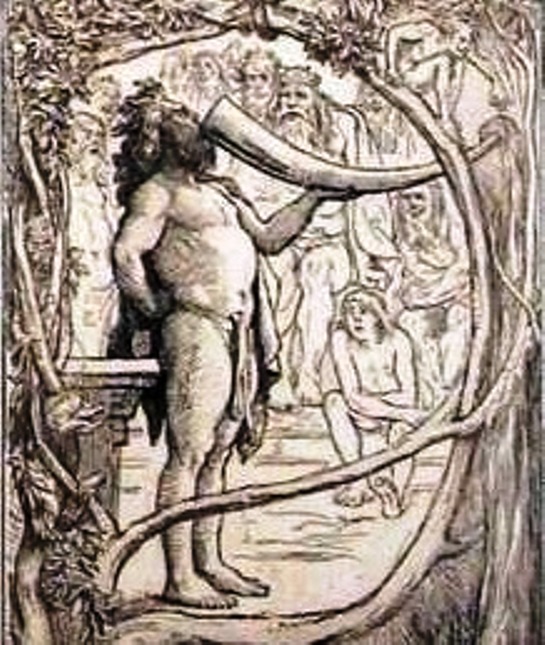
Thor, the Mighty Drinker
He also engages in three contests: drinking from the sea, lifting the Midgard Serpent, and wrestling Old Age. The horn is connected to the sea, in which the Midgard Serpent dwells. Thor, of course, will be killed by the serpent before he ever succombs to old age.
Sprayed by the venom of the Midgard serpent in its death throes, Thor will stagger back nine (3 x 3) paces before falling.
At Thrym’s, Thor alone drinks three casks of mead.
When Hrungnir visits Asgard, Freyja serves him from Thor's drinking vessel, as it is the largest in all of Asgard.
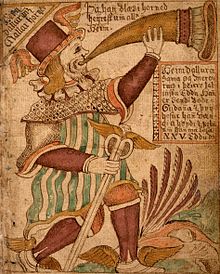
Heimdall Drinks the Good Mead
Heimdall's name can be translated as "world-tree" (from dallr, an archaic word for tree; dallr, a wooden bowl see Dronke, Poetic Edda Vol. II, p. 107)
In Grímnismál 13: Heimdall drinks the good mead, in Himinbjörg, his home at heaven's end.
The world-tree 'drinks' from the three wells at its roots. In the Hindu Rigveda, the oldest Indo-European religious text, trees are called "foot-drinkers".
Heimdall is often seen as a personification of the world-tree (See Ursula Dronke, Poetic Edda, Vol. II, pp. 48-49)
Three roots run in three ways below the the tree (Grímnismál 31).
Heimdall establishes three classes.
According to Hyndluljóð, the infant Heimdall drinks three draughts, associated with the three world-wells:
|
Varð einn borin |
35. There was one
born, in times of old, with wondrous might endowed, of origin divine: nine Jötun maids gave birth to the gracious god, at the world´s edge. |
|
Hann Gjalp of bar, |
36. Gialp gave him
birth, Greip gave him birth, Eistla gave him birth, and Eyrgiafa; Ulfrun gave him birth, and Angeia Imd and Atla, and Jarnsaxa. |
|
Sá var aukinn |
37. The boy was
nourished with the earth's strength, with the ice-cold sea, and with Són's blood. |
Compare this to the drink described in Gúðrunarkviða II, 21-22:
|
|
Grimhild brought me a cup to drink, Cool and bitter, so I could not recall the past, That drink was strengthened with Urd’s power Cool-cold sea and Són’s blood |
|
|
In that horn were staves of every kind risted and reddened —nor could I comprehend— the long heath-fish of Hadding's land an uncut ear of corn entrances for animals. |
The components of the potion refer to the three wells that feed Yggdrassils Askur.
The 'Earth's strength' (Jarðar magn) is Urdar magn, 'Urd's power' the healing liquid with which the norns lave the tree. In Havamál 137, Odin says: hvars þú öl drekkir, kjós þér jarðar megin, "where you drink ale, choose the earth's power."
'Cool-cold' sea is Hvergelmir, the mother of waters, flowing from the frozen north. One of its rivers is Svöl, 'cool'. Its waters form the river that rings the world.
Són is the name of one of the three vats containing the mead of poetry. According to Anthony Faulkes, "Sónar may mean 'heart' or 'breast'; See Roberta Frank 1978, 96-7, where it is argued that són is a common noun meaning 'reconciliation.'" (Skáldskaparmál, Index of Names, p. 509).
Sónr dreyr thus seems to be another name for Óðrerir, the coveted liquid from Mimir's well. Sónar dreyr has been interpreted as blood of a sacrifical boar, based on Sónar-galtr, a sacrificial boar. The word dreyr simply means blood, which can be poetically substituted for any liquid cp. Fáfnismál 1, hjörlegi, the 'sword-liquor', for blood.
The tripartiate drink represents the three liquids that sustain the world-tree, Yggdrassils Askur, ['Ash of Ygg's Horse'] a metaphor for Odin himself (See Grímnismál 30 and 44). The tree symbolically represents the human body.
Might we have the mythic antecedent of an actual ritual here?
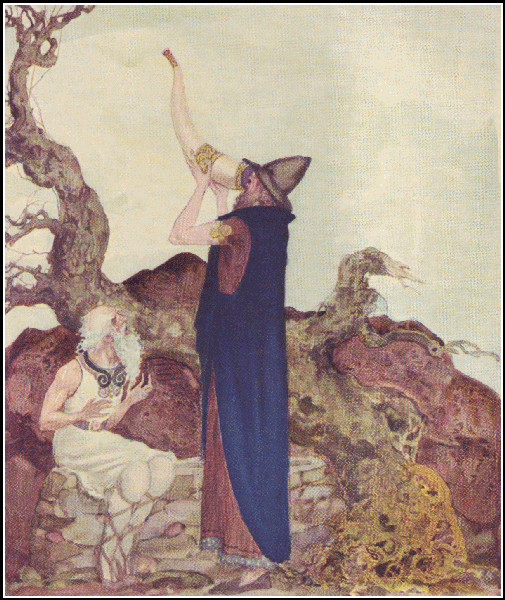
Odin Lives on Wine Alone
In the 7th century, Jonas of Bobbio records an encounter St. Columban had with the Suebi, who were preparing a sacrifice to their god. Their offering is mead:
“Once as he [St. Columban] was going through this country, he discovered that the natives were going to make a heathen offering. They had a large cask that they called a cupa, and that held about twenty-six measures, filled with beer and set in their midst. On Columban's asking what they intended to do with it, they answered that they were making an offering to their God Wodan (whom others call Mercury). When he heard of this abomination, he breathed on the cask, and lo! it broke with a crash and fell in pieces so that all the beer ran out.”From Heimskringla, The Saga of Hakon the Good:
"Sigurd, earl of Hlader, was one of the greatest men for sacrifices, and so had Hakon his father been; and Sigurd always presided on account of the king at all the festivals of sacrifice in the Throndhjem country. It was an old custom, that when there was to be sacrifice all the bondes should come to the spot where the temple stood and bring with them all that they required while the festival of the sacrifice lasted. To this festival all the men brought ale with them; and all kinds of cattle, as well as horses, were slaughtered, and all the blood that came from them was called hlaut, and the vessels in which it was collected were called hlaut-vessels. Hlaut-staves were made, like sprinkling brushes, with which the whole of the altars and the temple walls, both outside and inside, were sprinkled over, and also the people were sprinkled with the blood; but the flesh was boiled into savoury meat for those present. The fire was in the middle of the floor of the temple, and over it hung the kettles, and the full goblets were handed across the fire; and he who made the feast, and was a chief, blessed the full goblets, and all the meat of the sacrifice. And first Odin's goblet was emptied for victory and power to his king; thereafter, Niord's and Freyja's goblets for peace and a good season. Then it was the custom of many to empty the bragarfull; and then the guests emptied a goblet to the memory of departed friends, called the remembrance goblet."Here goblets are passed across the fire. The first drink is “given” to Odin. This reminds us of Odin’s position in the prose introduction to Grímnismál, tied between two fires. As Carolynne Larrington has recognized "Agnar’s ceremonial giving of the horn is, unbeknownst to Agnar himself, an act of sacrifice. ...Óðinn recognizes the nature of Agnar’s action when he blesses the boy, deliberately using the language of invocation (st 3: 1-2)."
After hearing the recitation of mythic lore in Grímnismál, Agnar will ascend to the throne.
In the surviving mythic lore, Odin is depicted taking three drinks under mythic circumstances. These drinks are highly symbolic.
1. As young man, Odin gets a drink from Mimir, an old man causing him to become ruler of the gods.
2. As a mature man, Odin gets a drink from Gunnlod, a woman whom he weds (See M.B. Richert's Attempt to Illuminate Dark and Obscure Passages in the Edda).
3. As an old man, Odin gets a cool drink from a young boy Agnar, whom he makes king.
The three drinks appear to correspond to each stage of a man’s life, involving the acquisition of knowledge necessary for success in each rite of passage. Each drink is followed by a recitation of esoteric knowledge. In turn, the three drinks correspond to the three world-wells which are said to feed "Yggdrasill’s Askur," the World Tree, which is both a symbol of Odin as "the Ash of Ygg's horse" (Yggdrassils Askur), as well as the body of man—just as the first man is named Askur. The association of macrocosmos with microcsomos is evident (and can be naturally extended further). For additional details, see stanzas 30 (inset) and 44.
I. As a young man, Odin obtains a drink
from Mimir’s well and becomes ruler
(Hávamál 138ff. Afterward he recites the Runatál)
Odin hung on the “windy tree” for nine nights
He ate nor bread or drank any water
He was wounded with a spear.
A sacrifice, Odin to himself.
Odin’s subordinant position and his being pierced with a spear suggest sexual submission—
To underscore this, he is pierced with a spear.
In Heimskringla, Snorri informs us that dying warriors devoted themselves to Odin by piercing themselves with a spear.
Compare the killing of the slave girl in Ibn Fadhlan’s account of the 10th century Rus: she is strangled (hanged) and stabbed. Some of the so-called Bog bodies bear marks of having been slain in the same manner.
Odin likely hangs on the Tree in an inverted position, according to Jere Fleck (1971).
Odin peers down into the fountain “which lies where Ginnungagap once was” and takes up the runes.
Odin’s eye and Heimdall’s ear (Völuspá 28, Heimdalls hljóð) in the well [symbol of the head, cauldron of the sea] may indicate an inversion, i.e. of a hanged man with his head down and feet in the air.
Eyes and ears are otherwise sensory organs of the head.
The head of the sacrifice, hanged by its feet to drain the blood, is symbolically equated with the cauldron.
The blood of the sacrifice (hlaut) is equated with the contents of the cauldron (mead)
After this drink, Odin began to “become wise, to grow, to blossom, etc”
After this event that he participated in the slaying of Ymir and crafting the world from the giant’s corpse.
Ymir was dissected and reshaped (man = cosmos)
Ymir is the first sacrifice, all subsequent sacrifice serve to recreate and sustain the cosmos [Bruce Lincoln]
It is beneath the middle root of Yggdrassils Askur, thus is called “Mimir’s Tree” (Fjölsvinsmál 20)
Mimir’s well lies “where Ginnungap once was” (Gylfaginning 9)
This episode represents the drink from Mimir’s well.
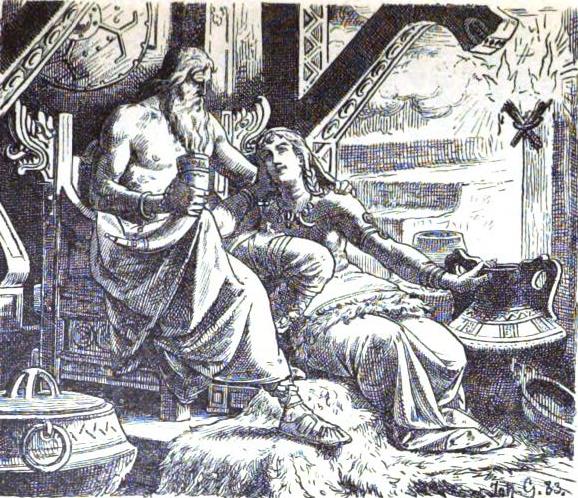
II. As a grown man, Odin obtains a drink
from Gunnlöd, whom he weds
(Hávamál 13, 14; 104-110;
Afterward he recites Loddfafnismál)
Odin bears the mead, flying from “Surts sökkdalir” (Surt’s sunken dales)
Surt lives in the fiery south.
The sun and moon were forged in this realm.
Hrafnagaldur Óðins 2 speaks of Urd’s Oðrerir.
Urd’s well is located in the “south” (Skáldskaparmál)
Swans swim in its warm waters.
The sacred water of Mimir’s well is known as Oðrerir ‘the soul-stirrer” the “rouser of wod”.
Mimir’s apprentice is Odin, whose name is built on the word óðr.
Odin's brother Hoenir provides men with óðr. Hoenir is closely associated with Mimir.
Surt-Durinn is possibly another name for Lodurr, Odin’s brother. (As deomstrated by Carla O’Harris)
Motsognir (Mimir) and Durinn work together to create the dwarves.
He craves the mead (evident by his actions), but at some point is exiled from it.
After breaking with Mimir (Motsognir), Durinn-Surt flees to the deep south.
Fjalar is also called Suttung, which may mean “Surt’s son”
Fjalar is another name for Utgard-Loki (Harbardsljóð 26)
His servants are wildfire, old age, and thought
He causes earthquakes with his snoring.
Loki causes earthquakes with his writhing.
Loki cuts/ burns away Sif’s hair
At Fjalar’s, Thor takes three drinks from a horn which is really the sea, and it noticeably lowers, causing ebb and flood tides thereafter.
The fire giants are skilled in visual allusions (heat mirages, feverish hallucinations)
Here, Odin beats them at their own game.
Odin arrived in the guise of the expected bridegroom (a visual allusion, ironically)
Odin assumes the high-seat, as the guest of honor
Odin weds Gunnlod and uses her to obtain the mead
[Lady with the Mead Cup]
Odin takes an oath on a ring to Gunnlod, i.e. he legally weds her
They retire to their bed chamber, but Odin steals the mead and makes his escape.
Odin betrays the ring-oath, he breaks the marriage vow.
For this (and the theft of the mead) he is her clan’s eternal enemy.
[If Surt is Odin’s brother Lodurr, gone bad… this adds additional depth]
Odin escapes (after a fight in which he kills Gunnlod’s brother).
Odin enters as a snake and leaves as an eagle, representing the animals at the root and the top of the tree. Thus, this episode evokes the world-tree itself; which I suggest is central to the theme of the myth.
The snake in the cave is an obvious sexual symbol.
Odin spits the mead into three vats (i.e. the three wells)
This episode symbolically represents a drink obtained from Urd’s well, which is female, hot, and southerly.
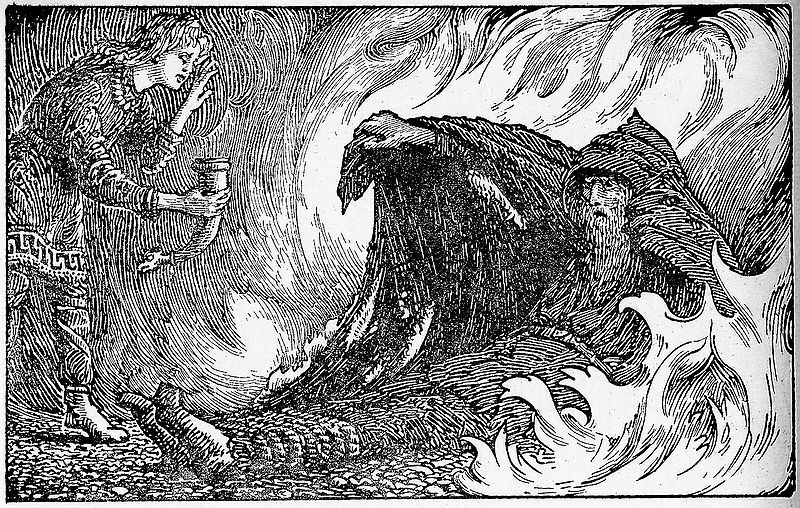
III. As an old man, Odin gets a drink
from a young boy, Agnar, whom he makes ruler
(Grímnismál 3, Afterward he recites Grímnismál)
The boy's father is Geirröd, a well-known giant's name
This represents Hvergelmir: male, cold, and northerly
The Prose Introduction to Grímnismál says:
“He was clad in a blue cloak, and was named Grimnir, and would say no more concerning himself, although he was questioned. The king ordered him to be tortured to make him confess, and to be set between two fires; and there he sat for eight nights. King Geirröd had a son ten years old, whom he named Agnar, after his brother. Agnar went to Grimnir and gave him a full horn to drink from, saying that the king did wrong in causing him to be tortured, though innocent. Grimnir drank from it. The fire had then so approached him that his cloak was burnt; whereupon he said: -“The poem begins:
1. Fire! thou art hot, |
51. Drunken art thou, Geirröd,
thou hast drunk too much,
thou art greatly by mead beguiled.
Much didst thou lose,
when thou wast
of my help bereft,
of all the Einherjar´s
and Odin´s favour.
52. Many things I told thee,
but thou hast few remembered:
thy friends mislead thee.
My friend’s sword
lying I see,
with blood all dripping.
53. The fallen by the sword
Ygg shall now have;
thy life is now run out:
Wroth with thee are the Disir:
Odin thou now shalt see:
draw near to me if thou canst.
The prose conclusion of the poem tells us that King Geirröd was sitting with his sword lying across his knees, half drawn from the scabbard as he tortured Grimnir, but on finding that Grimnir was actually Odin, he rose to pull him away from the fires, when the sword slipt from his hand with the hilt downwards; and the king having stumbled, was hoist on his own petard. The sword pierced him through and killed him. Odin then vanished, and Agnar was king for a long time after.
The boy's father being pierced by a sword is a kind of perverse sexual symbol. The father is symbolically emasculated and replaced by his own son. The torch is now passed to the next generation.
This appears to be the ultimate meaning in the pattern under discussion here: the cyclical nature of time, the great cycle or the circle of life. Dare I say the Ring-Cycle?
Odin now imbibes a drink from a young man, when Odin himself is old.
This is the inverse of the first drink. Instead of being offered a drink of wisdom from Mimir, an old giant, Odin is now offered a drink by a young boy to whom he passes sacred knowledge.
At the first drink, Odin becomes ruler of the gods.
Upon the third drink, Odin elevates Agnar to become ruler of the Goths.
The son inherits his father's kingdom.
Eight seems to be especially associated with the giants (see Stanza 2).
The drink itself is “cool”
Geirröd is unmistakably a famous giant’s name.
Thor battled Geirröd and his daughters.
Thor pierced Geirröd with a piece of molten slag (the raw material of a sword), which the giant had thrown at him. In other words, the giant Geirröd is killed by his own weapon.
King Geirröd, dies in the same manner, pierced with his own sword in the prose conclusion of Grímnismál.
Geirr-röd means “Spear-red”; Odin is the spear god.
Men pierced with a spear or sword are dedicated to Odin.
Odin takes the boy he once favored (King Geirröd) and in time elevates another.
This episode symbolically represents the drink from the well Hvergelmir in the cold north. Symbolically the well is masculine.
The northern well is the home of ancient frost-giants and poisonous serpents (see stanzas 31 and 34).
Snakes are obvious phallic symbols. When Odin visits Gunnlod, he enters in the form of a snake, through a bored hole.
Cold water has phallic properties. Water is hard when frozen, and becomes flaccid when in its liquid form.
The most ancient giants appear to breed asexually, producing children "without the pleasure of a giantess."
Male (Hvergelmir) and Female (Urd's well) must come together to form new life (Mimir's well). Gylfaginning 9 informs us that Mimir's well is where Ginnungagap once was, a temperate place between the worlds of ice and fire, from which all life springs. In Ginnungagap, when the molten fires of the south met the ice-floes of the north, life sprang from the "quick-drops" (living drops). Thence Ymir and Audhumbla arose. From them all living descended.
The mystery of the number three is that from two polar extremes a third balanced thing is produced.
Cold + Hot = Just Right
Male + Female = An Infant
A Cup for a Song
This theory is strengthened when we see that after each of Odin's three drinks, representing a drink from each of the three wells which water Yggdrassil, Odin chants a galdr-song.
Chronologically Odin first hangs on Yggdrasil, when he exchanges his eye for a drink from Mimir's well in Hávamál 138 ff. His recitation of the Runatal follows.
Hávamál 138 occurs at the end of the Loddfafnismál, the recitation Odin sings after taking a drink from Gunnlöd in Hávamál 104-110. Symbolically, this drink represents Urd's well.
Hávamál 137:
|
Ráðumk þér, Loddfáfnir, |
I advise you,
Loddfafnir to take advice: you will profit if you take it, do you good, if you get it: Wherever you drink ale, choose the power of earth* for earth is good against drunkeness, fire for disease, but oak for constipation, a corn-ear for sorcery a hall against domestic strife. In hatred invoke the moon; the biter for bite-disease; but runes against calamity; earth shall absorb fluid. |
*Compare the expression Jardar magn with Urðar magn in Gudrunarkvida II, 21. Carolyne Larrington observes: "power of earth: the substances mentioned may be invoked or be incorporated into some kind of ritual." (Poetic Edda, 1996, p. 268)
In Grímnismál, after Agnar's drink (representing Hvergelmir),
Odin recites Grímnismál, and coronates Agnar.
Thus the Eddaic lore seems to have a greater design, and purpose than
it is generally given credit. Are these poems in fact a hoard of
numinous knowledge? In
this context, Grímnismál can be seen as the ritual knowledge passed to
a king by Odin before assuming rulership, akin to the kind passed onto
Kon the Younger (Kong-ungr, King) by Rig-Heimdall in Rigsþula. Scholars
such as Jere Fleck and Carolyne Larrington have suggested as much, but
to date none have realized its full implications. May this Study Guide
be another step toward that goal.
[PREVIOUS][MAIN][NEXT]
[HOME]